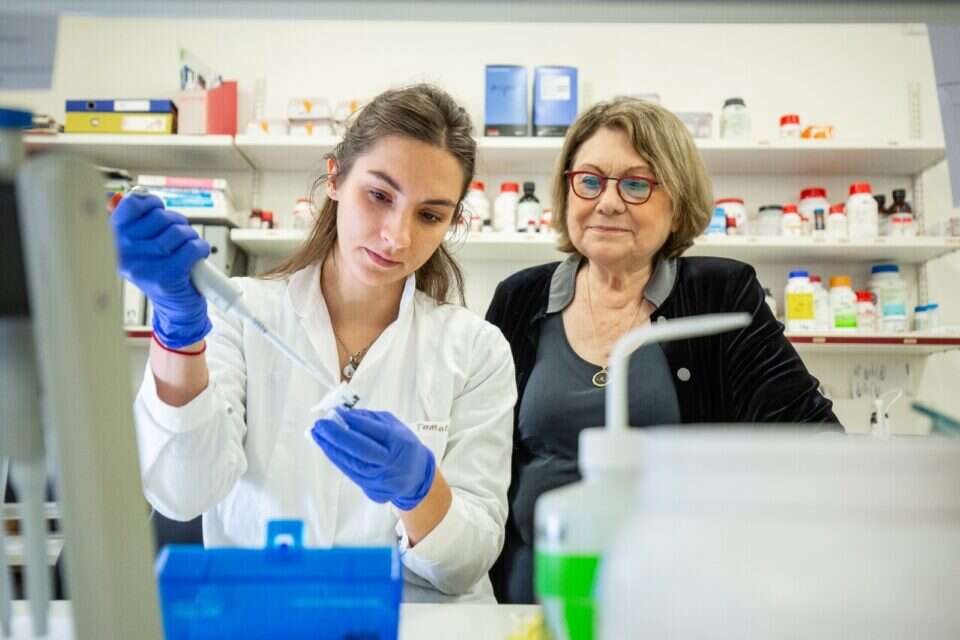A significant breakthrough in Alzheimer's research among women: A new study led by Hebrew University researchers Prof. Hermona Sorek and Prof. Jonathan Levinstein of the Safra Center for Neuroscience and the Institute of Life Sciences has found a surprising molecular mechanism in the brains of Alzheimer's disease patients, which explains the rapid deterioration in women's cognitive indices compared to men with the disease.
Prof. Hermona Sorek on the discovery in Alzheimer's research in women // Hebrew University
It has long been known that dementia indices rise faster and more intensely in women than in men, but the causes remain unknown. The discovery is an essential step on the way to finding a drug suitable for women who suffer from it.
Prof. Sorek, one of the world's leading researchers on gene expression in the brain, succeeded, in collaboration with her research colleagues, in finding a molecular mechanism that occurs in the brains of Alzheimer's patients, which does not occur in men, and which explains the acceleration of cognitive decline in Alzheimer's disease patients.
The article was published in Alzheimer's & Dementia: The Journal of the Alzheimer's Association.
Women lose cognitive ability faster than men
Alzheimer's, one of the most serious degenerative diseases, tends to affect more severely in women, who experience a faster decline in their cognitive abilities, than in sick men. Today, many researchers are looking for information about the factors that lead to cognitive deterioration in the disease and are trying to develop drug treatments to prevent the symptoms.
The treatment protocol currently aims only to delay the development of symptoms of the disease and is known to cause more severe side effects in women with the disease, compared to sick men. This means that the decline in the functioning of women with Alzheimer's disease does not stop in response to treatment and the side effects caused by the treatment are more severe compared to sick men.
For the first time, the study found a direct link between a family of tiny RNA fragments and the rate of disease development in women. The researchers found that the depletion of the stores of these RNA fragments in the brain reflects the rapid development of cognitive impairment among women with Alzheimer's, but does not reflect changes in brain structure, but rather in the cognitive index of the women with Alzheimer's. "Our study has shown remarkably well that the reservoirs of transported RNA fragments from a mitochondrial source, known to be donated by the mother, are depleted in the damaged brain nuclei and that this phenomenon is particularly pronounced in the brains of women with it.
The Contribution of COVID-19 to Research
The findings of the study shed new light on the mechanisms for controlling the development of Alzheimer's disease among women and highlight the fundamental differences, not only in the way the disease develops in women, at a faster rate than in men and with a faster deterioration in cognitive indicators, but also in the way symptoms are treated, since today RNA-based treatments have become a practical option following the COVID-19 pandemic and there is room for hope against this background." Prof. Sorek explained.
"This is the first time that we can offer a molecular explanation for the processes that occur in patients' brains and why the treatment protocol that has been offered to them to date is insufficient. The discovery could have implications for the way we study and treat Alzheimer's and dementia," Prof. Sorek concluded, adding: "I hope that this new discovery will lead to good and optimal treatment of Alzheimer's patients and help them and their families around the world."
The innovative research was carried out by a number of researchers, headed by Prof. Sorek and Prof. Levinstein, student Dana Shulman, and in collaboration with American colleagues, including Prof. David Bennett from Chicago, Elliott Mapson from Arizona and Sudha Sashadry from Texas, and supported by American research institutes and the Foundation for Basic Research, as well as with the support of the Stein Foundation and Sami Sagol.
Wrong? We'll fix it! If you find a mistake in the article, please share with us








